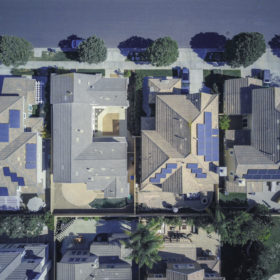Imagine being on a boat on a hot summer day: swimming, working on the tan, maybe drinking a few adult beverages. Well, if that boat happens to have a Mercury Marine engine on board, you can also imagine rooftop solar.
That’s because Mercury Marine, a division of Brunswick Corp., added a solar array at its world headquarters in Fond du Lac, Wisconsin, part of its ongoing effort to enhance sustainable operations. The array sits atop a warehouse, includes 320 solar panels, and will help power operations over the system’s expected 30-year lifespan.
The project follows a solar array Mercury installed at its European headquarters in Petit‑Rechain, Belgium, in 2017. That installation, along with some insulation updates, slashed the facility’s dependence on grid power by a third, leading to savings on utility bills and more reliance on clean energy.
(Hog maker Harley-Davidson added rooftop solar at one of its big Wisconsin plants in December. Read about that project here.)
The solar project at Mercury Marine in Wisconsin is part of a goal President Chris Drees announced last year to meet at least half of the company’s electricity needs with renewable resources by the end of 2030. Parent company Brunswick has a similar 50%-by-2030 renewable energy target.

Image: Brunswick Corp.
In addition to solar, Mercury has taken several more energy-friendly measures, including upgrading lighting and HVAC systems and focusing on power optimization. On Earth Day 2020, the company won a Wisconsin’s Focus on Energy program award for its efforts.
“These steps will combine with many others over the next 10 years,” Drees said in a statement. “We are committed to our focus on sustainable business practices, including investment in renewable energy and reduction of our carbon footprint. We will continue to elevate our commitment to sustainability across all of our global locations.”
This content is protected by copyright and may not be reused. If you want to cooperate with us and would like to reuse some of our content, please contact: editors@pv-magazine.com.









By submitting this form you agree to pv magazine using your data for the purposes of publishing your comment.
Your personal data will only be disclosed or otherwise transmitted to third parties for the purposes of spam filtering or if this is necessary for technical maintenance of the website. Any other transfer to third parties will not take place unless this is justified on the basis of applicable data protection regulations or if pv magazine is legally obliged to do so.
You may revoke this consent at any time with effect for the future, in which case your personal data will be deleted immediately. Otherwise, your data will be deleted if pv magazine has processed your request or the purpose of data storage is fulfilled.
Further information on data privacy can be found in our Data Protection Policy.